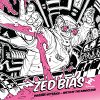[Tru Thoughts]
There has been a recent trend in electronic music albums towards eclecticism. There are two related reasons for this: One is quite obviously the pace at which music mutates and the music producers are continually exposed to, making it easy to understand why they might try to include a wide breadth of sounds on their albums. Another longstanding influence on this trend is the mix and mixtape culture in dance music. Zed Bias (aka Maddslinky) has been steeped in that culture since the mid-90’s and has always been riding the crest of what’s new in dance music, from garage and broken beat to his own take on 2-step that was instrumental in the rise of dubstep. His latest full-length is a wild and survey of everything under the sun, which succeeds on some levels and perhaps suffers from its own eclecticism on other levels. Biasonic Hotsauce – Birth of the Nanocloud boasts 12 collaborators over the course of 18 tracks — running the gamut from dancehall MCs to star bass music producers — and it feels very much like a mixtape.
“Yagga” featuring Serocee and “Do It” featuring Dynamite MC start the festivities off with uptempo dancehall rollers. With the Soul II Soul cover “Fairplay,” the album makes it’s first large departure into soulful disco numbers. “Koolade” is a very modern disco workout, updating what artists like Daft Punk started with a slinky house feel courtesy of collaborator Toddla T. Mark Pritchard takes a break from Africa Hitech for the juke-inspired “Trouble in the Streets,” which doesn’t feel out of place next to “Koolade” because they are anchored by Zed Bias’ ragga-leaning bass lines. However, it feels like a mistake to include an update of the producer’s well-known 1999 hit “Neighbourhood.” Even though he’s done his best to make it fit into the genre-hopping melting pot here, it can’t help but feel dated instead of nostalgic, with a DJ-worshipping vocal and 2-step beat.
Some of the most interesting turns come from a trio of garage and dubstep luminaries, the first being with Falty DL on “Lucid Dreams,” a lighter track in the midst of the ragga and hard driving bass lines of previous songs. Likewise, the vocodered style of Sam Frank makes “Night Lovers” into a surprisingly bluesy electronic funk. Over a loping beat and minimal instrumentation, Frank’s vocal provides most of the texture and melody to the song without sounding “futuristic” at all. By contrast, it actually makes the song sound very old, like it would fit into an old Western recounting the travels of a couple across the desert. Lastly, Skream teams up for the blistering dubstep wobbler “Badness,” an extremely straight-laced, stripped-down example of what still makes him a star.
Curiously, the final two tracks attempt to ride the wave of atmospheric menance in Skream’s track, but go in wildly different directions. “All Out” is strengthened by a compelling vocal from Mighty Moe, but eschews its wonderfully deep intro for a less interesting beat frenzy that fails to mesh with the vocal. Closing track “Sinner” would be an incredibly dynamic moment on a more cinematic leaning album, but tucked away at the end, the breakbeat experiments sound like an anticlimactic end to the roller coaster of the album. In a way, this is exemplary of the strengths and the weaknesses of Biasonic Hotsauce. There is so much vitality to the individual tracks that they feel constrained by the album format. If the album had been released as a series of EPs exploring different facets of Zed Bias the producer, the result would have felt stronger and more immediate.















